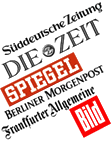Leszek Miller, leader of Poland's Social Democratic Party, was in Berlin at a meeting of the Friedrich Ebert Stiftung (foundation) this past week to discuss the entry of Poland into the European Union (EU). The subtitle of the article in Der Tagesspiegel read "The Travel Plans of the Polish Social Democrats," which was a reference to the political direction—presently unknown—of Miller and the Polish Social Democrats.
Times... they are a changin'
Der Tagesspiegel looks upon Miller somewhat cynically. It was only in 1989, the paper points out, that he sat at his desk in the Politburo as one of the "hardest politicians of the Left." Times have changed. Now, "even the Chancellor takes time for Leszek Miller—so much so that the Polish chief of the Social Democrats came at least half-an-hour late," Christoph von Marschall writes.
Further to the point, the ex-Communist let the word "comrades" slip during the introduction of his delegation. He was able to explain this faux pas away by saying that in times gone by his travels would have taken him to Moscow. Apparently, Miller did not notice that he was not in Soviet Russia or the German Democratic Republic. Alas, old habits die hard. But Miller is a politician, and von Marschall's article says that he is converging with the current wishes of the majority of Poles. He speaks for the EU; he stands for NATO. The only question is who he could join in a coalition to win the upcoming fall election, which Der Tagesspiegel seems to think he will.
How do you say Haider in Slovak?
While Der Tagesspiegel worried about the possible political coalitions on the Polish front, Die Süddeutsche Zeitung drew attention to a coalition forming in Slovakia—between Pavol Rusko, president of the influential Slovak TV station Markíza, and Róbert Fico, who leads the Smer movement. The article of 31 January is titled "Berlusconi and Haider in Slovak." Silvio Berlusconi (Italian media mogul and leader of the centre-right opposition) is Rusko in Slovakia and Jörg Haider is Fico, in the opinion of writer Michael Frank.
The comparison is not particularly apt. After all, Haider is Austrian and Berlusconi Italian, and the two have nothing to do with each other. Rusko and Fico, on the other hand, do. Frank writes that Rusko has widespread influence through his ownership of television and radio, and Fico has widespread political popularity. Together, they could present a powerful team, one that could draw in Slovak voters, which, says Frank, would not represent a positive turn of events for Slovakia.
But this coalition is only just in the works. And it is anybody's guess how it could or will end. The Süddeutsche article hypothesises that if this developing partnership succeeds, it will spell the end of democratic diversity in Slovakia. However, if it fails, it will mean a surge in popularity and support for Slovak Premier Mikuláš Dzurinda. The article is also interesting, however, in light of the fading Czech Television crisis next door. Do political connections and bias exist in the media? Gasp. Could it really be?
Scharping goes to Moscow
German Defence Minister Rudolf Scharping was in Moscow this week, visiting with Russian Foreign Minister Igor Ivanov. "Scharping Shares Moscow's Concerns about the National Missile Defence Programme," reads the headline in the 31 January edition of Die Berliner Zeitung. "Scharping Meets with Criticism in Moscow," reads the headline in Die Frankfurter Allgemeine Zeitung on the same day.
Evidently, the two newspapers wanted to stress different aspects of Scharping's Moscow visit. Die Berliner Zeitung emphasised the Minister's concern about the US National Missile Defence programme. The paper cites Scharping as stating that "the international structure of armaments regulations must not be threatened."
Die Frankfurter Allgemeine Zeitung cites the very same words, taking, however, a decisively different tone in its report of the visit. This paper describes Scharping's commentary on the defence programme as "restrained" and "careful." The article rather emphasises the critical attitude of Moscow toward the planned enlargement of NATO. Why? Because such an enlargement would endanger Russian interests. "Russia has no right to veto the enlargement of the union [NATO]. However, by the same token other nations have no veto over our right to protect national interests." Most, however, are still wondering what those national interests might be.
Forget about Belarus
The Handelsblatt writes on 30 January that Russian interests no longer lie in Belarus. "Russia's President Putin Withdraws His Protective Hand from Lukašenka," outlines the precarious nature of Russian-Belarusian relations. "Putin cannot afford to have a dictator as a partner, because he will want to strengthen his relationship with the West at the beginning of George W Bush's period in office."
Aliaksandar Lukašenka, the article reports, is "more than irritated by this." And as support from Russia is lost, attacks on the West seem to mount. Lukašenka recently said he would not tolerate the presence of OSCE election monitors in Belarus's fall elections, further adding that there would be no "Koštunica in Belarus."
On the same day, Handelsblatt also reported on the issue of Russian debts to Germany. The article stressed that both sides were warming to the idea of "debt-equity swaps," which are currently being discussed by German Finance Minister Hans Eichel and Russian Finance Minister Aleksei Kudrin.
Even the most sceptical seem to be accepting the idea of debt-equity swaps, the article reports. This issue is key to improving Russian–German relations, which Chancellor Schröder seems to support.
However, for this week, the German press had more to say on Polish-German and Russian-Belarusian relations and internal Slovak affairs. Mounting Russian debts to Germany will have to wait.
Andrea Mrozek, 2 February 2001
Moving on:
- Archive of German press reviews
- Browse through the CER eBookstore for electronic books
- Buy English-language books on Germany through CER
- Return to CER front page
Sources:
Frankfurter Allgemeine Zeitung
Die Süddeutsche Zeitung
Die Tagesspiegel
Die Berliner Zeitung
Handelsblatt




